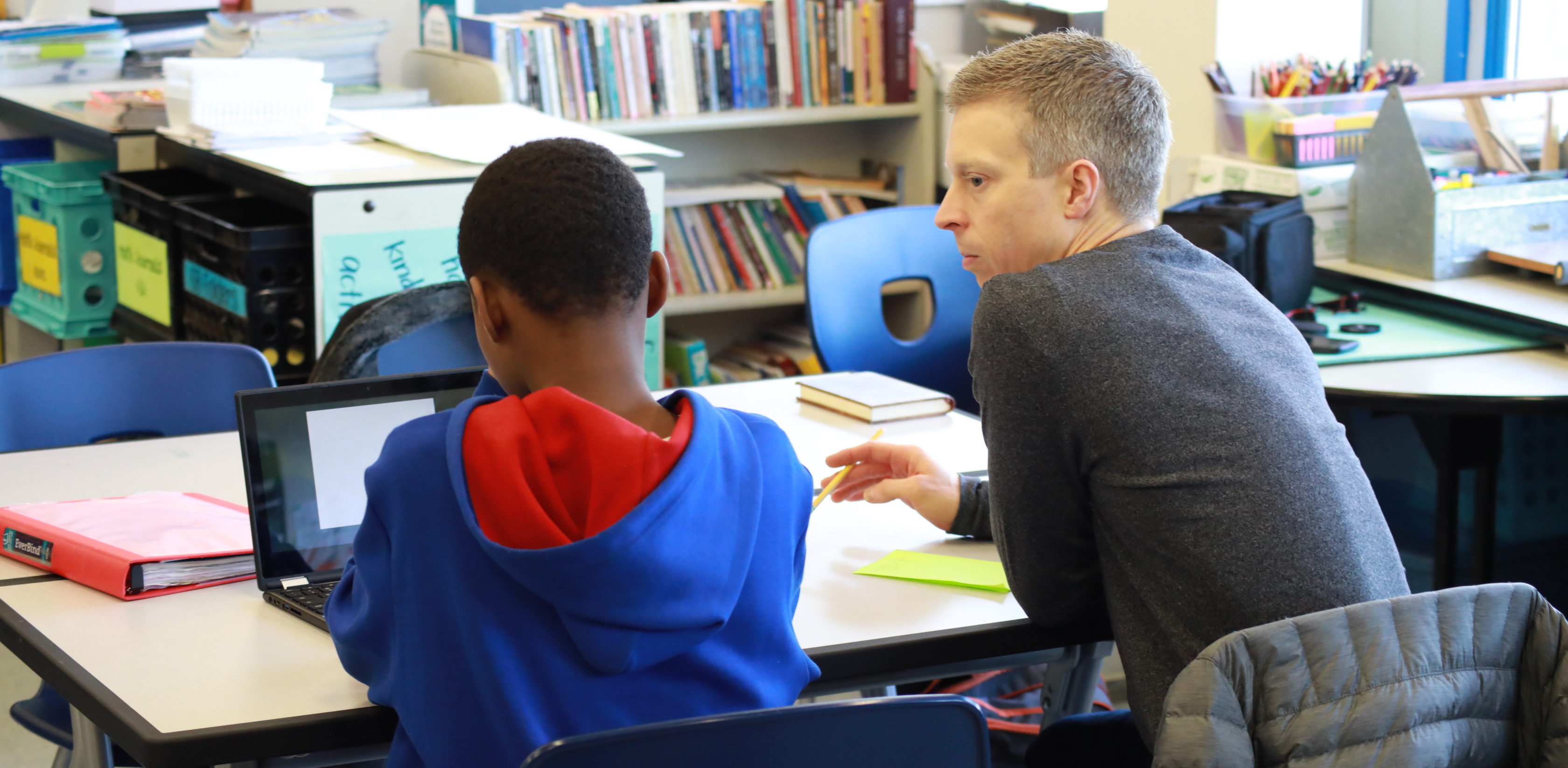 It’s a familiar story: the ball is in your hands, the path to the basket is clear, and all that’s left to do is take the shot. They say what happens next is up to you — but that’s only one perspective.
It’s a familiar story: the ball is in your hands, the path to the basket is clear, and all that’s left to do is take the shot. They say what happens next is up to you — but that’s only one perspective.
Success is about more than just making the shot; it’s about all the things that brought you to that moment — how practice put you in the right position, and how coaches, teammates, and cheerleaders helped you gain the confidence to take your shot.
In the classroom, an academic mentor can be a critical component in ensuring students have the ability to recognize opportunities and the confidence to seize them.
For Josh — a seventh-grade student at the Jackson/Mann K-8 School — turning math problems into basketball analogies with a mentor helped him become the confident learner he knew he could be.


Ms. Lewis has been teaching Josh for two consecutive years, and has watched him grow and mature with the help of his mentor, Brad Hoekzema.
Ms. Lewis selected Josh to work with an academic mentor because she felt his potential was being lost without one-on-one attention. “Last year, Josh was in the advanced work class, and he was having an incredibly difficult time keeping up. It wasn’t that he couldn’t do the math. He just lacked the confidence.” This affected Josh in a number of ways: he would not only be unwilling to answer questions, but he was often too shy to ask them. He grew frustrated with his progress, which led to a lot of poor behavior during class time.
It’s difficult for any student to ask for help in front of a classroom of their peers. That’s why one-on-one attention can be so important for students like Josh. “Students try to protect themselves,” says Ms. Lewis. “They think, ‘Oh, I can’t say that. I’m never going to ask that question.’ But in one-on-one talks, they will. They will say, ‘Actually, I have no idea, what that means.’ And then you can have a conversation.” It became clear that Josh could benefit from a “coach.”
Enter Brad. Since getting matched with Josh, Brad has been helpful in breaking down the X’s and O’s of math concepts for Josh each week. Yet his biggest achievement as a mentor has been giving Josh the confidence to ask questions and take chances when he thinks he knows the answer. The camaraderie they’ve built began early, and was established over a mutual love of basketball.
“We usually talk about basketball, that’s how we really connected. Honestly, if I met Josh outside of the classroom environment, we probably would still be talking about basketball,” says Brad, with a laugh. As they make their way through math sessions, Brad will use basketball as a way to encourage Josh to work. Often, Josh will look up stats to compare NBA players, and Brad will work them into the daily lessons.
Because of this rapport, Josh has learned to trust Brad not only as a tutor, but as a reliable friend and role model. Ms. Lewis notes that Brad’s relaxed demeanor has been very formative for Josh over the past year:
“When Josh works with Brad, he takes some of that and says ‘Oh, I’m gonna be calm and balanced too.’ Brad has some incredible patience. Josh had some really bad days last year. He just kept at it no matter what Josh’s emotional state was. He was flexible enough to meet Josh where he was. That was the most meaningful thing to Josh. To see that and think, ‘He’s not going to yell at me, he’s not going to be the one to get me in trouble. He’ll help me calm down.’”


That kind of added encouragement is what Ms. Lewis finds most valuable about having an academic mentor in the classroom. “The biggest thing is when someone else is rooting for these kids. Letting them know that they can do this! That makes a huge, huge difference. Those kids carry that with them, because they know someone believes in them. They are a little more willing to raise their hand next time. A little bit more willing to take a risk, and try to explain something to their group.”
With Brad’s help, Josh’s behavior in class, his work ethic, and his abilities have all greatly improved. “There were times last year where they may not have done any math. Brad would go through things with him and Josh would just kind of listen,” explains Ms. Lewis. “It’s different now. Josh actively does math and asks questions, and he’s engaged.”
Brad has noticed the improvement, too: “His work ethic is what has improved the most. He used to not always get his homework done. I’ve heard from him and Ms. Lewis that since we’ve been working together, he’s become a lot more focused.”
Recognizing that newfound focus, Brad wanted to find a way to reward Josh for his progress over the year — and he knew the perfect incentive. He suggested to Ms. Lewis that he and Josh could use one of their final mentor sessions to play basketball together. “In June, they decided to go out and play, explains Ms. Lewis. “Brad bought him a t-shirt from his college, and Josh was head over heels. I mean, it was awesome. He wore that shirt for the rest of the year.”
Josh left a real impression on Brad as well. After the school year, Brad asked Ms. Lewis if he could return to her classroom to work with Josh again this year. “At the time I knew I was going to be teaching Josh again,” said Ms. Lewis. “Brad was really interested in continuing with Josh, and thank goodness he did because Josh is a whole new kid now.”
Now in their second year, Josh has become a confident student, excited about the progress he’s made and more prepared for class every day. With Brad by his side, he’s ready to take the shots that come his way.
